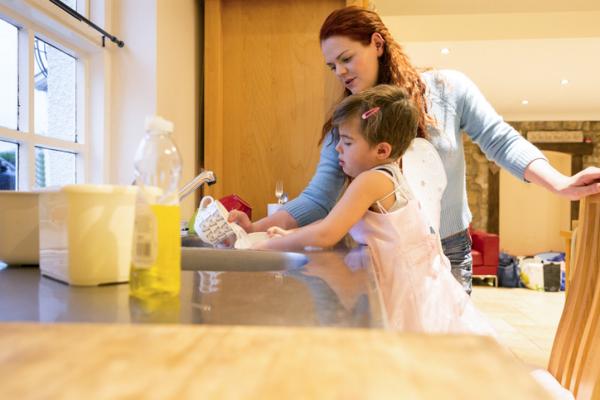Find out if you could be a foster carer
In a few simple questions, you’ll know if you’re suitable to apply to become a foster carer.
While the number of children identifying as transgender is growing year on year, gender dysphoria is still a widely misunderstood condition, and one that many parents and carers can find difficult to approach. But with an open mind, you can quickly come to understand more about gender identity – and give a transgender child the positive guidance and support they need.
If you currently look after a child or young person who is struggling with gender dysphoria, or you simply want to learn more about how to approach issues of gender, our guide to supporting and caring for a transgender child can help you provide positive support.
Perhaps the best place to start is by looking at what gender dysphoria means, so you can better understand what your child may be going through.
Gender dysphoria is when a person’s gender identity differs from the one they were assigned at birth. They may identify as male, female, non-binary (meaning they feel they aren’t truly male or female) or any of the three at different times in their life, and this can naturally cause a lot of confusion, worry and feelings of isolation.

As a society, we still enforce traditional male/female expectations on children from birth, and expect certain things of them as they grow up based on their gender. While there is a growing openness towards gender dysphoria, it remains a delicate and misunderstood condition, and some young people who live through it find it very upsetting and difficult to deal with.
Many young people start to understand their feelings towards gender in their teens, particularly as they enter puberty – a time which can be extremely difficult as the body starts changing. It’s at this time that children often need positive support and guidance the most, as gender dysphoria can turn into feelings of depression, isolation and suicidal thoughts if left unchecked.
There are no set signs which tell you when a child may have feelings of gender dysphoria, and the fact that many children actively hide how they feel can make it very difficult to spot. However, there are certain indicators which may give you an idea of what they may be going through, so it’s important to observe your child’s behaviour and keep a mental note of things which might strike you as unexpected.
Below, we look at some of the traits of gender dysphoria which you may notice in your child.
Non-conforming tendencies – Children often enjoy playing with toys or dressing in a way which doesn’t conform with gender norms, and this doesn’t mean they are transgender. However, if a child has strong and continuous preferences towards things which don’t conform with their gender, it’s something to keep an eye on and perhaps share with their social worker.

Common non-conformist tendencies include:
Depressed and withdrawn – For young people of all genders, there’s a huge amount of pressure to conform, and this can make it seem impossible to air their true feelings and live how they want to. This constant need to hide away from their true selves can result in feelings of anxiety, depression, and social anxiety, which can, sadly, often manifest in self-harming behaviours or suicidal thoughts.
If you notice that your child seems suddenly withdrawn from family life, it could be a sign that something is wrong. Even if it’s nothing to do with gender dysphoria, depression in young people can be extremely damaging, so it’s important that you take steps to address how they may be feeling.
Listen to how your child identifies themselves – Children develop an idea of their own gender identity at a surprisingly early age, and gender dysphoria can emerge when they’re very young. It can be easy to dismiss the feelings of very young children, believing that they’ll just grow out of it, but often, if a young person identifies as trans, they probably know it from an early age.
Listen to how your child identifies. They may refer to themselves as a boy, even if they were assigned a girl at birth, and vice versa. Children can feel strongly about this from early development, so it’s one of the key signs to look out for in youngsters.

Gender is hugely formative and can affect all parts of a child’s life, from their school friends to their career prospects. If a child grows into adulthood with confused feelings about their gender identity, this may impact on their ability to live a full and happy life, so it’s vital that you’re there to provide positive support and advice.
In the short term, taking care of a child with gender dysphoria can be challenging. You may find it difficult to adjust to your child’s decision, and even basic day-to-day things like calling them by the right name and referring to them as he/she/them will take some getting used to. It’s also completely fine to feel upset or worried about their decision, provided that you remain open-minded and have their best interests at heart.
The most important thing you can do for your child as they transition between genders is simply be there for them and show them your full support. Acceptance, support and love are crucial at this confusing and difficult time, so don’t be afraid to express your feelings and show them that, whatever the outcome, you’re supportive.
Looked after children who experience gender dysphoria are more likely to struggle with their gender identity as they progress through their teenage years and into early adulthood. This is because they may not feel comfortable or confident enough to talk about their feelings with their foster family.
As a foster carer, it’s your job to create a trusting environment for children in your care. Nurturing a child or young person to live life as their true gender is hugely important for their mental wellbeing, so a tolerant approach is vital in helping them develop confidence and self-esteem.

There are lots of things you can do to help children in your care who may be experiencing issues with their gender identity. The first thing you should do is to talk to their social worker, as well as your foster care agency, as they will be able to provide useful guidance and training on caring for transgender children and young people.
There are also lots of resources available online where you can get help, hear stories and learn new skills which will better equip you to provide the right kind of support for your child. We would recommend Mermaids as a great place to start for information on gender dysphoria and caring for transgender children, specifically their resources section, which includes some really useful links to guides, videos and e-learning courses that will help bolster your knowledge and understanding.
At NFA, we provide complete support to all our foster families, and work closely with you to make sure you receive the training you need to give a child a happy home.